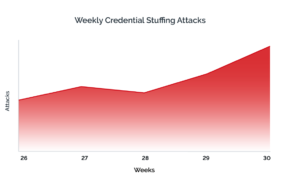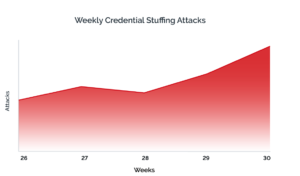Fraudsters Go for Olympics Gold Attacking Streaming Sites, but are Foiled by Arkose Labs
Since the establishment of the Olympic Games in ancient Greece in 776 B.C., the event has been an occasion for athletes and competitors from around the world to test their skills against the very best. This year, while many of us marveled at the amazing feats in gymnastics, track & field, swimming, and more, some fraudsters were attacking streaming sites to show off their skills in the realm of credential stuffing. While they aimed for gold in this particular dark art, they were foiled by Arkose Labs.
The Arkose Labs platform protects one of the most prominent and popular streaming media platforms, which also was one of the platforms that broadcast the Olympic games. During the games, Arkose Labs detected a much higher spike in traffic coming to the streaming platform than normal. Much of this, however, was not simply an increase in viewers coming to watch feats of athletic strength and speed, but fraudsters performing credential stuffing attacks. In fact, credential stuffing attacks spiked by 52% during the week of the opening ceremony, peaking during the closing ceremony.

Credential stuffing is one of the major attacks that powers account takeover fraud. It is when fraudsters use automation to run millions of username and password combinations on accounts until they get a match. Years of data breaches have exposed these usernames and passwords, and large lists can be purchased on the Dark Web for relatively little. Some even post them for free on sites like Pastebin.
Account takeover attacks are highly popular among fraudsters because of the numerous ways they can be monetized. They can drain money from an account or steal personal information and resell it to other criminals. They can use the compromised accounts to launder or move stolen money obtained from another crime. And there are many industry-specific paths to monetization as well.

RECOMMENDED RESOURCE
A New Approach to Fraud Prevention
In attacking streaming sites, fraudsters often seek to launch mass attacks at scale, since these accounts are not as lucrative as, say, financial accounts. This means fraudsters need volume to make money and gain access to as many accounts as possible to resell…


